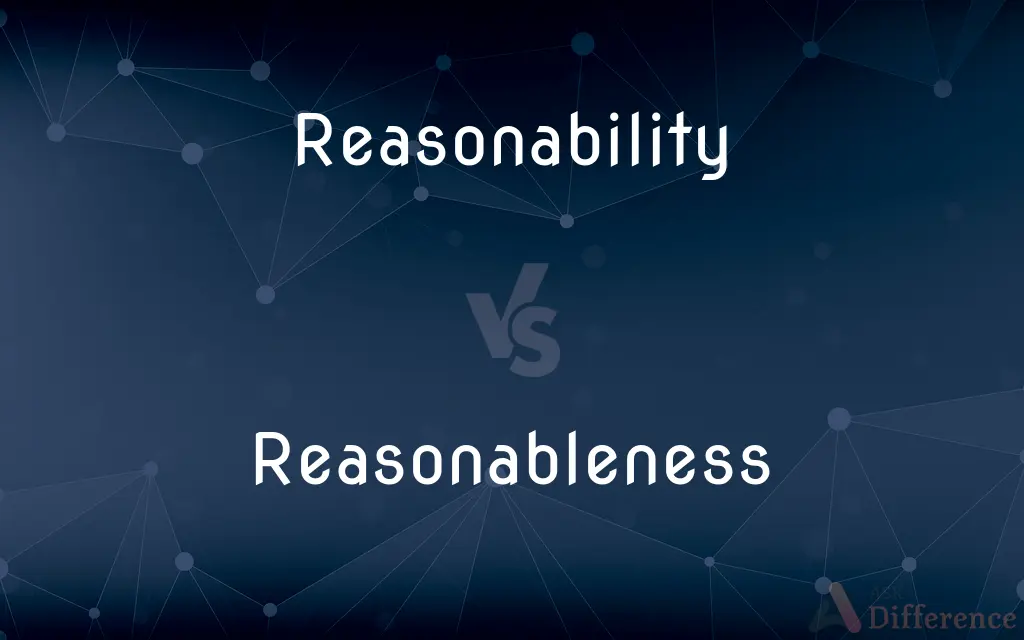Reasonability vs. Reasonableness — What's the Difference?
By Maham Liaqat & Urooj Arif — Updated on March 22, 2024
Reasonability highlights logical soundness, while reasonableness emphasizes fairness and moderation in judgment.

Difference Between Reasonability and Reasonableness
Table of Contents
ADVERTISEMENT
Key Differences
Reasonability often refers to the quality of being logical or justifiable based on reason. It's about the soundness of an argument or decision from a rational perspective. For example, the reasonability of a strategy depends on its logical foundation and potential for success. Reasonableness, on the other hand, leans more towards the quality of being fair, moderate, and sensible. It involves a balance of logic, empathy, and practicality in judgment or decision-making. The reasonableness of a compromise, for instance, reflects its fairness and acceptability to all parties involved.
When considering the application in legal contexts, reasonability is frequently used to evaluate the logical consistency and justification of actions or decisions, particularly in the realm of procedural aspects. In contrast, reasonableness is a broader term in legal discourse, often related to the equitable and fair nature of actions, decisions, or expectations. It's a key standard in assessing the appropriateness of conduct under certain circumstances.
In everyday language, reasonability might be invoked in discussions about the logical soundness of ideas or plans, emphasizing a more analytical approach. Whereas, reasonableness is more commonly used in conversations about the fairness or moderation of actions, decisions, or expectations, underscoring a more empathetic or balanced viewpoint.
Comparison Chart
Focus
Logical soundness
Fairness and moderation
Context
Often used in logical or analytical discussions
Common in discussions about fairness or practicality
ADVERTISEMENT
Legal aspect
Evaluates procedural logic and justification
Assesses equitable nature and appropriateness
Emphasis
Analytical and rational approach
Balanced, empathetic judgment
Common usage
In evaluating strategies or ideas
In assessing compromises or decisions
Compare with Definitions
Reasonability
Logical soundness.
The reasonability of the plan was unquestionable, given its thorough analysis.
Reasonableness
Fairness.
The reasonableness of the settlement reflected a fair compromise.
Reasonability
Justifiability.
The reasonability of her argument made it difficult to dispute.
Reasonableness
Moderation.
His reasonableness during negotiations helped reach an agreement.
Reasonability
Analytical approach.
The reasonability of the method was evident in its systematic approach.
Reasonableness
Practicality.
The reasonableness of the solution lay in its simplicity and practicality.
Reasonability
Rational perspective.
From a rational perspective, the reasonability of the new policy was clear.
Reasonableness
Balanced approach.
The reasonableness of their demands made them easier to fulfill.
Reasonability
Basis in reason.
His decision's reasonability was rooted in a solid understanding of the facts.
Reasonableness
Sensible judgment.
Her reasonableness in handling the dispute prevented further conflict.
Reasonability
Reasonability is a legal term. The scale of reasonability represents a quintessential element of modern judicial systems and is particularly important in the context of international disputes and conflicts of laws issues.
Reasonableness
Capable of reasoning; rational
A reasonable person.
Reasonability
Capable of reasoning; rational
A reasonable person.
Reasonableness
Governed by or being in accordance with reason or sound thinking
A reasonable solution to the problem.
Reasonability
Governed by or being in accordance with reason or sound thinking
A reasonable solution to the problem.
Reasonableness
Being within the bounds of common sense
Arrive home at a reasonable hour.
Reasonability
Being within the bounds of common sense
Arrive home at a reasonable hour.
Reasonableness
Not excessive or extreme; fair
Reasonable prices.
Reasonability
Not excessive or extreme; fair
Reasonable prices.
Reasonableness
(uncountable) The state or characteristic of being reasonable.
Reasonability
The state or quality of being reasonable; reasonableness.
Reasonableness
(countable) A reasonable action or behaviour.
Reasonableness
Quality of being reasonable.
Reasonableness
The state of having good sense and sound judgment;
His rationality may have been impaired
He had to rely less on reason than on rousing their emotions
Reasonableness
Goodness of reason and judgment;
The judiciary is built on the reasonableness of judges
Reasonableness
The property of being moderate in price;
The store is famous for the reasonableness of its prices
Reasonableness
Moderation in expectations;
Without greater reasonableness by both parties we will never settle this matter!
Reasonableness
The quality of being plausible or acceptable to a reasonable person;
He questioned the tenability of my claims
Common Curiosities
Is reasonableness important in legal decisions?
Absolutely, reasonableness is crucial in legal decisions, emphasizing the equitable nature and appropriateness of actions.
Can reasonability apply to legal contexts?
Yes, in legal contexts, reasonability often pertains to the logical consistency and justification of actions.
Do reasonability and reasonableness overlap?
While they have distinct focuses, reasonability and reasonableness can overlap, particularly when fair and logical judgment is required.
How is reasonableness characterized?
Reasonableness is characterized by fairness, moderation, and sensible judgment.
Is reasonability only about logic?
Primarily, yes. Reasonability focuses on the logical and analytical aspects of decisions or ideas.
Are there universal standards for reasonability?
Universal standards for reasonability are difficult to establish due to varying logical and analytical frameworks.
Can reasonableness lead to compromise?
Yes, the emphasis on fairness and balance in reasonableness often facilitates compromise.
What defines reasonability?
Reasonability is defined by logical soundness and justifiability based on reason.
How does culture affect perceptions of reasonableness?
Cultural norms and values can influence what is considered reasonable in terms of fairness and moderation.
Can a decision be reasonable but not reasonable?
It's possible for a decision to be logical (reasonable) but not fair or moderate (reasonable), highlighting the distinction between the two.
How do you assess the reasonableness of a compromise?
The reasonableness of a compromise is assessed based on its fairness and acceptability to all parties involved.
Why is reasonableness valued in negotiations?
Reasonableness is valued in negotiations for promoting balanced, fair, and practical outcomes.
Can a strategy be both reasonable and reasonable?
Yes, a strategy can be both logically sound (reasonable) and fair/moderate (reasonable) in its approach and outcomes.
Is reasonability subjective?
While based on logical foundations, reasonability can still be subject to interpretation and perspective.
How do emotions impact reasonableness?
Emotions can influence reasonableness, particularly in making judgments more empathetic and balanced.
Share Your Discovery

Previous Comparison
Copse vs. Spinney
Next Comparison
Handbag vs. PurseAuthor Spotlight
Written by
Maham LiaqatCo-written by
Urooj ArifUrooj is a skilled content writer at Ask Difference, known for her exceptional ability to simplify complex topics into engaging and informative content. With a passion for research and a flair for clear, concise writing, she consistently delivers articles that resonate with our diverse audience.















































